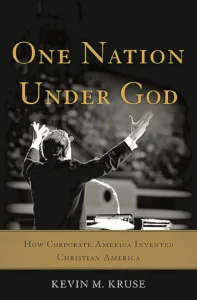 Summary: The subtitle “How Corporate America Invented Christian America” does not work, but the history is still fascinating.
Summary: The subtitle “How Corporate America Invented Christian America” does not work, but the history is still fascinating.
One Nation Under God is the third book of Kevin Kruse’s that I have read. I follow him on Twitter, and I appreciate his work. However, at this point, I wonder if Kruse’s niche is the history of the development of libertarianism in the US. The first book I read by Kevin Kruise, White Flight, was about Atlanta’s racial history and white flight and how white flight helped to encourage libertarian thought. The second book I read by Kruse was Fault Lines, a history of the US since 1974. Fault Lines was co-authored with Julian Zelizer, and while it is a comprehensive political history, its attention to the rise of political media was where it shined. It was not primarily about libertarianism, but you cannot tell the story of modern political history without the story of libertarian thought becoming mainstream within the GOP.
One Nation Under God is about how modern politics has become rhetorically religious in a different way from previous history. The primary history of the book is about how “One Nation Under God” was added to the Pledge of Allegiance and “In God We Trust” was added to our currency just a couple of years before the Supreme Court eliminated compulsory prayer and bible reading from schools. That story is commonly presented as a Cold War story. The US culturally understood itself as Christian in opposition to the USSR as an atheist country. So, it needed to demonstrate its religious nature publicly and self-identify as a country founded on religious principles. Kruse seeks to complicate that story by moving back to the 1920s and 1930s and showing how a conscious and planned work of corporate institutions and wealthy individuals used religious motivations and institutions to make a theological case for Christianity as an individualistic, pro-capitalist, and anti-government religion. Christian Libertarians were a category in the 1920s-30s, not just in the Tea Party movement. The epilogue of the book makes the case that these are connected movements.
The book’s weakness is that the case for corporate influence on Christianity was weak beyond the 1920s-30s history of corporate intervention and propaganda in the first section of the book. It was not corporate America as a whole but a particular stream of conservative wealthy businessmen, often connected to oil and resistant to government regulation. I have not read the book, but I have listened to an interview with Darren Dochuk about his book Anointed with Oil: How Christianity and Crude Made Modern America. So, I think the case Kruse sought to make can be made more clearly there. In One Nation Under God, the real focus is on the history of how politicians and religious corporate leaders sought to encourage a type of cultural-religious meaning for their benefit. And how that shifted politics to an overtly religious rhetorical posture. Politicians have always used biblical references to communicate ideas. But the phrase “and God bless America” at the end of speeches was almost absent before Reagan. After Reagan, politicians of both parties regularly used it even as a more rigid line was being drawn, preventing government institutions like schools from advocating religious speech.
I listened to this during a single day on a very long car trip. It kept me engaged, and as expected, much of history was new to me. At the same time, because I am not unfamiliar with the rise of the religious right, Billy Graham and his political influence and the role of corporate wealth in missions and evangelism funding during the mid-20th century, and the role of civil religion in the mid 20th century, I was not wholly convinced of the argument of the subtitle. There was an influence, but that influence was not definitive in the way the subtitle suggests. As long as you have limited expectations, I think this book is worth reading.
One Nation Under God: How Corporate America Invented Christian America by Kevin Kruse Purchase Links: Paperback, Kindle Edition, Audible.com Audiobook